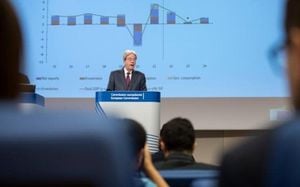China's ascendance on the global stage has dramatically reshaped geopolitical dynamics, especially as the U.S. grapples with its position amid potential shifts with the incoming Trump administration. Stakeholders worldwide are bracing for changes as Donald Trump promises to reassert America's influence, particularly concerning international diplomacy, which has seen strains under his first term from 2017 to 2021.
While the stakes are high, the response from China is being observed closely. The Chinese government’s approach appears multifaceted, aiming at both leveraging strategic engagements and asserting its influence over Southeast Asian nations, primarily through economic agreements and regional cooperation.
Enter Indonesia, the largest country within ASEAN and regarded as the most populous Muslim-majority nation. Prabowo Subianto, Indonesia's newly elected president, seems to be steering the country toward closer ties with China just weeks after taking office. Initiatives previously rejected by Indonesia's diplomatic terrain are now seemingly being entertained under this new leadership.
During his trip to Beijing on November 9, Prabowo signed a joint statement with President Xi Jinping. This marked Indonesia's acceptance of claims long resisted, including China's maritime assertions. While Indonesia has taken pride in asserting its maritime sovereignty, this agreement might mark the loss of some diplomatic ground as it recognized certain overlapping claims—a significant departure from its long-held stance.
For years, Indonesia was steadfast against China’s so-called nine-dash line, which refers to Beijing’s claims across the South China Sea. The 2016 ruling by the Permanent Court of Arbitration declaring those claims without merit had set the tone for Indonesia's diplomatic posture on maritime disputes. Yet, with the new concessions made by President Subianto, concerns are rising about the legitimacy and recognition of China’s previously unacknowledged territorial claims.
What’s even more alarming is the manner of these concessions. By agreeing to collaborate on issues concerning joint development, the Indonesian government may be lending credence to China’s ambitions, effectively rolling back years of diplomatic resistance. Observers view this as not merely political maneuvering but rather as economically motivated actions driven by potential financial benefits from collaboration with China.
The economic aspect cannot be understated. Prabowo is reportedly targeting ambitious economic growth—aiming for 8 percent annually—by engaging countries like China for investment and cooperation, particularly on initiatives related to technology and green energy worth billions. Such governmental strategies raise the question of whether economic benefits are being prioritized over national sovereignty.
Despite this shift, President Prabowo, who previously criticized his predecessors for their approach to the South China Sea, now finds himself torn between advancing his nation's economy and protecting its territorial integrity. His government’s public discourse continues to assert the importance of international maritime law, even as practical gestures may conflict with such statements. This perceived contradiction indicates potential volatility within Indonesian foreign policy under his leadership.
The embrace of China is significant not solely for Indonesia but for Southeast Asia as well, as regional nations must negotiate competing influences from both China and the U.S. Under Trump’s leadership, America’s strategic posture in the Pacific is expected to pivot toward more assertive posturing, which could unsettle the existing balance of power.
Looking through the prism of the larger geopolitical framework, the ripple effects of Trump's forthcoming presidency could influence not just U.S.-China relations but also how nations worldwide choose to align themselves, weighing their economic interests against the backdrop of regional security and sovereignty concerns.
International observers are left pondering what this shift means for Ukraine and Middle Eastern stability. Trump has previously positioned himself as having the unique capability to broker deals, but he walked a fine line of contention with Russia and the Middle East, which remain fractious. His return may prompt increased scrutiny of his diplomatic strategies, especially as pressures mount globally.
On the ground, Trump’s approach will still reflect the 'America First' doctrine, which emphasizes domestic priorities, but critics argue it undermines long-term U.S. commitments overseas. The return may stoke tensions not only with adversarial states but also among allies wary of Trump's unpredictable foreign policy style.
Trump's strategy of confrontation with adversarial powers, combined with his past penchant for making deals, sets up a scenario ripe for both conflict and opportunism, affecting nations caught somewhere between these competing powers. This has been the reality for countries like Indonesia, who now navigate the delicate balance of aligning national interests with regional security dilemmas.
Indeed, the shifting tides of diplomacy showcase the dual-edged nature of international relations with growing competition for influence at play. This dynamic completely transforms the economic and security frameworks Indonesia previously navigated smoothly.
The gambit now lies with Indonesia: Will Prabowo's government redefine its international positioning to prioritize economic ties over traditional sovereignty claims, or will it seek to uphold its established diplomatic principles? The choices made now will have lasting consequences for this populous nation, its neighbors, and beyond.
China’s growing influence presents both opportunities and challenges for nations like Indonesia, and adjusting their strategies to appease both local needs and larger geopolitical shifts becomes increasingly difficult. How these decisions will resonate on the ground and affect the everyday lives of citizens remains to be seen, but the world is certainly watching.



